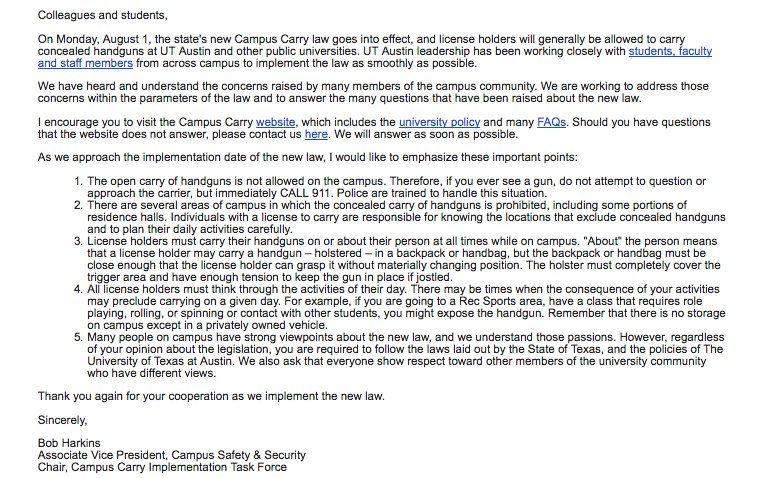BY HANK REICHMAN
I am old enough to remember August 1, 1966 — fifty years ago today — when a mentally disturbed ex-marine, Charles Whitman, climbed to the top of the tower at the University of Texas at Austin (UT) with an arsenal of high-powered weapons and began shooting. For 96 terrifying minutes, Whitman fired at students and passersby, killing at least 16 people and injuring 31 in what many call the opening act of what has so horribly become an era of mass shootings. I had just completed my freshman year and was traveling the U.S. with a friend that summer, the first time I’d really seen much of the country outside the east coast. Like many others, I was deeply shocked by this tragedy and can still recall the moment I learned of it. Today UT is commemorating the victims and survivors with a series of ceremonies culminating in a rededication ceremony for a plaque and garden first dedicated in 1999. At the rededication ceremony, the university will unveil a new memorial to the victims and survivors of the tragedy. A committee of survivors and university staffers planned the memorial and ceremony.
Unfortunately, however, the Texas Legislature last year chose a rather different way to remember this horrible event. For today also marks the day when Texas’s new “campus carry” law goes into effect, allowing licensed gun holders to carry concealed handguns at public universities in the state, including UT Austin. As if to highlight their own insensitivity, legislators purposely chose the anniversary of Whitman’s rampage as the law’s implementation date. The law touched off heated debate in Austin, with several professors recently filing a complaint in federal court to block the law before classes begin August 24.
On this terrible day, it is fitting, I think, to repost a statement issued last November by the AAUP, the American Federation of Teachers, the Association of American Colleges and Universities, and the Association of Governing Boards on such “campus carry” laws:
The horrific shootings at Umpqua Community College in Oregon and subsequent incidents of gun violence elsewhere have prompted renewed efforts to keep our colleges and universities both safe and open. One measure increasingly proposed is legislation—already approved in eight states—that would allow any licensed gun owner to carry concealed weapons on campus. Advocates of such so-called “campus carry” legislation contend that the presence of weapons in classrooms and other campus facilities will deter those seeking to wreak violence. Oregon is one state where “campus carry” is legal, but that did not prevent the tragedy.
Colleges and universities closely control firearms and prohibit concealed guns on their campuses because they regard the presence of weapons as incompatible with their educational missions. College campuses are marketplaces of ideas, and a rigorous academic exchange of ideas may be chilled by the presence of weapons. Students and faculty members will not be comfortable discussing controversial subjects if they think there might be a gun in the room.
William McRaven, chancellor for the University of Texas system and a former member of the Navy SEALs who rose to the rank of admiral, opposed passage of “campus carry” legislation in his state. “I feel the presence of concealed weapons will make a campus a less-safe environment,” he said. “If you have guns on campus, I question whether or not that will somehow inhibit our freedom of speech. If you’re in a heated debate with somebody in the middle of a classroom and you don’t know whether or not that individual is carrying, how does that inhibit the interaction between students and faculty?”
The undersigned organizations strongly support efforts to make college campuses as safe and weapon-free as possible for students, faculty, staff, parents, and community members. We therefore oppose efforts to enact “campus carry” laws and call for their repeal where they already exist. We encourage colleges and universities to embrace critical incident planning that includes faculty and staff and to advise all faculty and staff of these plans. We further call on these institutions to rely on trained and equipped professional law-enforcement personnel to respond to emergency incidents. State legislative bodies must refrain from interfering with decisions that are properly the responsibility of the academic community.
Signatories
American Association of University Professors
American Federation of Teachers
Association of American Colleges and Universities
Association of Governing Boards of Universities and Colleges
Other scholarly organizations have also issued statements opposing such legislation.
And if you’re wondering about how UT is handling the new law, even as it commemorates the lives of those who first suffered mass gun violence at the campus fifty years ago today, here is an email sent to faculty, staff, and students at the university:




Pingback: Campus Carry and Academic Freedom: The Emerging Reality | ACADEME BLOG
Pingback: “Campus carry” and academic freedom: The emerging reality |